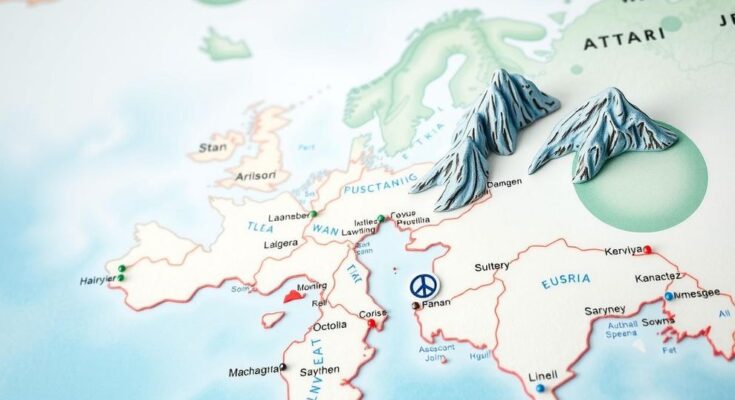Israel and Lebanon commence negotiations on border disputes, establishing joint working groups to address occupied areas, the Blue Line, and detainee issues. The discussions were facilitated by international players, including the US and France. Israel released five Lebanese detainees as a gesture towards Lebanon’s leadership while continuing military operations against Hezbollah in response to security threats.
On Tuesday, Israel and Lebanon reached an agreement to initiate negotiations aimed at delineating their land border. This decision follows a four-nation meeting that included representatives from the United States and France, conducted at the United Nations peacekeeping headquarters in Naqoura, Lebanon. In conjunction with this agreement, three joint working groups are set to be established, commencing next month to address several critical issues.
The working groups will concentrate on five areas currently occupied by Israel within Lebanon, the Blue Line which indicates the informal border, contentious points, and Lebanese citizens held by Israel. In a significant gesture towards the newly elected Lebanese President Joseph Aoun, Israel has agreed to release five Lebanese detainees, with the arrangement facilitated by the United States.
Lebanon confirmed the release of four Lebanese nationals by Israel, with a fifth individual scheduled for return. Reports suggest that among the released is an individual affiliated with Hezbollah, and overall, there are eleven Lebanese citizens currently held by Israel. Previous negotiations facilitated by the US during Yair Lapid’s tenure as Prime Minister addressed maritime boundaries, marking a new diplomatic milestone in Israeli-Lebanese relations.
The ceasefire established following the November truce ended over a year of conflict, particularly between Hezbollah and Israel. The hostilities reignited after Hezbollah’s attacks commenced on October 8, 2023, in support of Hamas, provoking retaliatory actions from Israel that displaced a significant number of civilians.
US Deputy Presidential Special Envoy Morgan Ortagus emphasized the commitment of all parties to uphold the ceasefire agreement, looking forward to hastily assembling the diplomatic working groups to address these lingering issues. Despite this diplomatic progress, Israel has continued military operations against Hezbollah members south of the Litani river, executing drone strikes as part of its security measures.
The Israeli Defense Forces targeted a Hezbollah commander, Hassan Abbas Izzedine, reflectively noted as a pivotal figure in the terror group’s aerial defense unit. This operation signifies Israel’s ongoing strategic efforts to mitigate threats posed by Hezbollah, even amid the awaited negotiations. Additional airstrikes targeting Hezbollah operatives and weapon assets highlight this ongoing conflict dynamic in the region.
In summary, Israel and Lebanon’s agreement to negotiate their land border marks a significant reduction in tensions, facilitated by international cooperation. The establishment of joint working groups reflects a commitment to resolving complex issues, including detainee exchanges and territorial disputes. Despite this diplomatic progress, tensions remain high as Israel continues to engage in military operations against Hezbollah in response to security threats. The situation remains fluid and will require concerted diplomatic efforts to ensure long-lasting peace.
Original Source: vinnews.com




